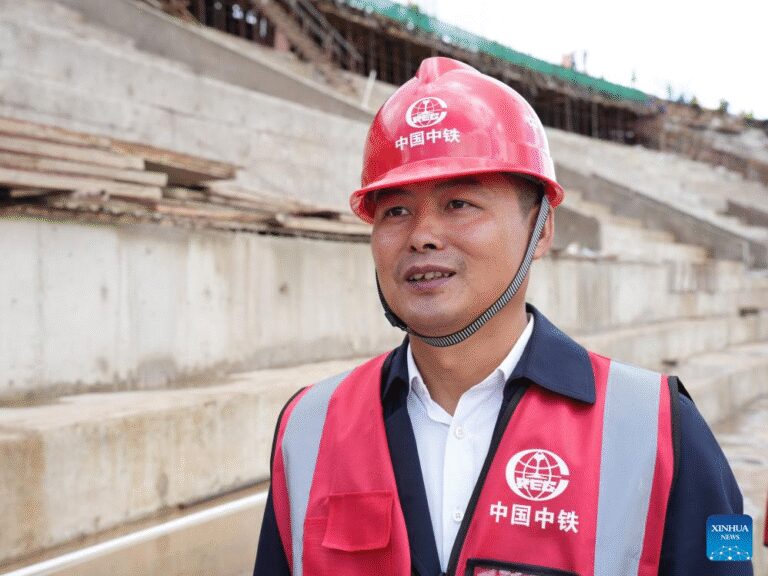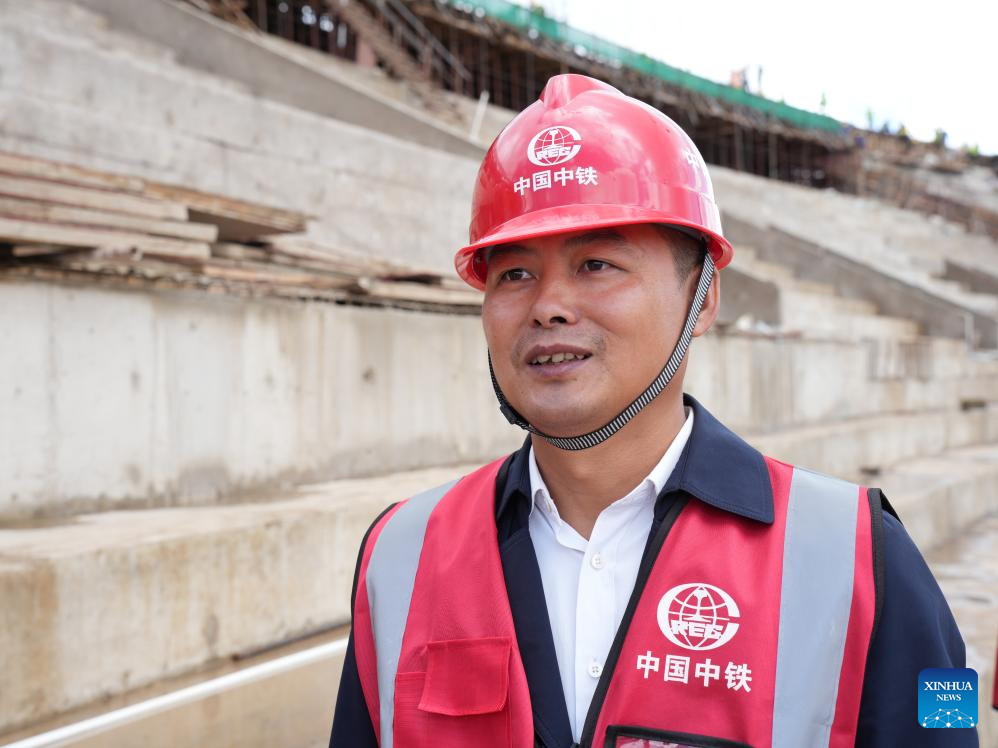
Li Lin, project executive manager of China Railway Construction Engineering Group (CRCEG), speaks in an interview in Arusha, Tanzania, on April 25, 2025. Set to become one of the venues for the 2027 Africa Cup of Nations (AFCON), the stadium is more than just a sports facility; it is a symbol of Tanzania’s commitment to hosting major international events. (Xinhua/Li Yahui)
by Xinhua writer Hua Hongli
DAR ES SALAAM, May 26 (Xinhua) — Mustafa Hashim Chikawe, a 35-year-old electrical and mechanical engineer, stood on the bustling construction site of a comprehensive sports stadium in Arusha, northern Tanzania. His gaze was fixed on towering cranes as they lifted steel beams into the sky.
As a father of three, Mustafa has been working here for nine months with the China Railway Construction Engineering Group (CRCEG), overseeing electrical and piping installations.
“I got this job because I impressed my boss in a previous project,” said Mustafa, with a hint of pride in his voice. He recalled his time with China Railway Jianchang Engineering Company (East Africa) Limited, where he contributed to the construction of hotels and government buildings.
“From my experience working with Chinese companies, I’ve learned that they deliver high-quality work and are very dedicated,” he said.
But for Mustafa, the significance of the stadium goes far beyond that of a simple project.
Set against the misty silhouette of Mount Meru, the rising steel structure embodies a dream, which is a vision of transformation for Arusha, a city often nicknamed the “Geneva of Africa” for hosting the East African Community headquarters and numerous international organizations.
“Once the project is completed, we will have upgraded the infrastructure significantly, especially considering that Arusha is a tourist region,” he said.
Nearby, Patrick Mallya, a seasoned quantity surveyor with nine years of experience at CRCEG, carefully monitored the site’s progress. With a degree from Ardhi University, Patrick has built his career alongside Chinese mentors, acquiring skills that extend far beyond his academic training.
“I have achieved many personal milestones here. I’ve gained knowledge, learned to operate various machinery, and become familiar with new construction technologies,” Patrick explained, tracing the lines of a blueprint with his hands.
“But the most valuable lesson has been learning discipline and precision, which are qualities my Chinese supervisors always emphasize,” he said.
Such stories are common at the Arusha stadium site, where local workers are not only building a landmark but also transforming their own lives. Mustafa’s team has become more skilled, learning from Chinese engineers and mastering advanced technologies.
This cross-cultural exchange has turned the construction site into a classroom, where techniques and values are shared beyond the blueprints.
“The stadium’s construction requirements are much higher than ordinary buildings, so the workers trained here can now handle various engineering projects,” said Li Lin, project executive manager of CRCEG. His voice was calm yet firm, embodying the discipline that had guided the project through challenges.
Set to become one of the venues for the 2027 Africa Cup of Nations (AFCON), the stadium is more than just a sports facility; it is a symbol of Tanzania’s commitment to hosting major international events.
Spanning 142,200 square meters, the project will feature a 30,000-seat stadium with LED screens, an energy-efficient lighting system, and smart technologies for ticketing and management. Inspired by Tanzania’s blue sapphire and Mount Kilimanjaro, the stadium’s design incorporates the colors of the Tanzanian flag, a symbol of national pride.
But the stadium’s impact goes beyond its steel and concrete. Patrick envisioned it as a boost to local businesses, while Mustafa saw it as transforming Arusha’s cityscape and creating new career opportunities for local engineers.
For Zhang Zhewei, a young Chinese engineer fresh out of university, the stadium is both a project and a self-evolving journey. He joined the team almost a year ago, doing drone photography and rotating through different technical departments to learn from every angle.
“I learned about the Tanzania-Zambia Railway in my textbooks, which inspired me through the China-Africa partnership. Now, through my drone’s lens, I watch the stadium evolve, and I, along with my local colleagues, grow day by day,” he said.
“When the AFCON kicks off here in 2027, these stories of construction will become unforgettable memories, just as vibrant as the games themselves,” Zhang said, a quiet pride shining in his eyes. ■
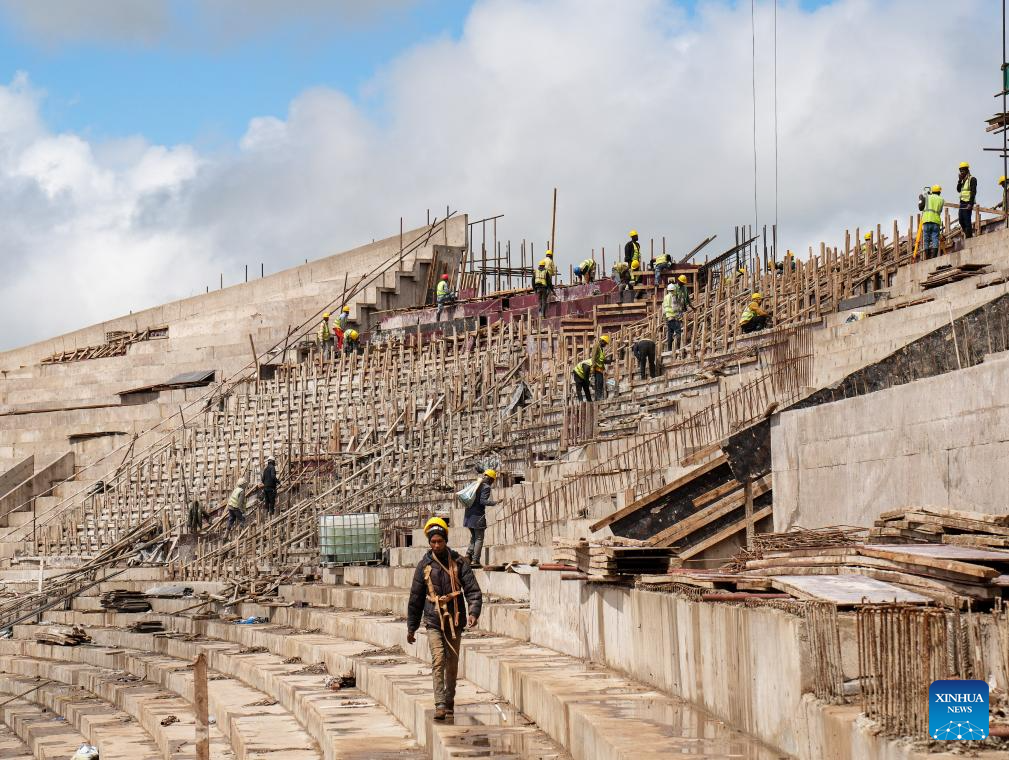
People work at a comprehensive sports stadium under construction by China Railway Construction Engineering Group (CRCEG) in Arusha, Tanzania, on April 25, 2025. Set to become one of the venues for the 2027 Africa Cup of Nations (AFCON), the stadium is more than just a sports facility; it is a symbol of Tanzania’s commitment to hosting major international events. (Xinhua/Li Yahui)
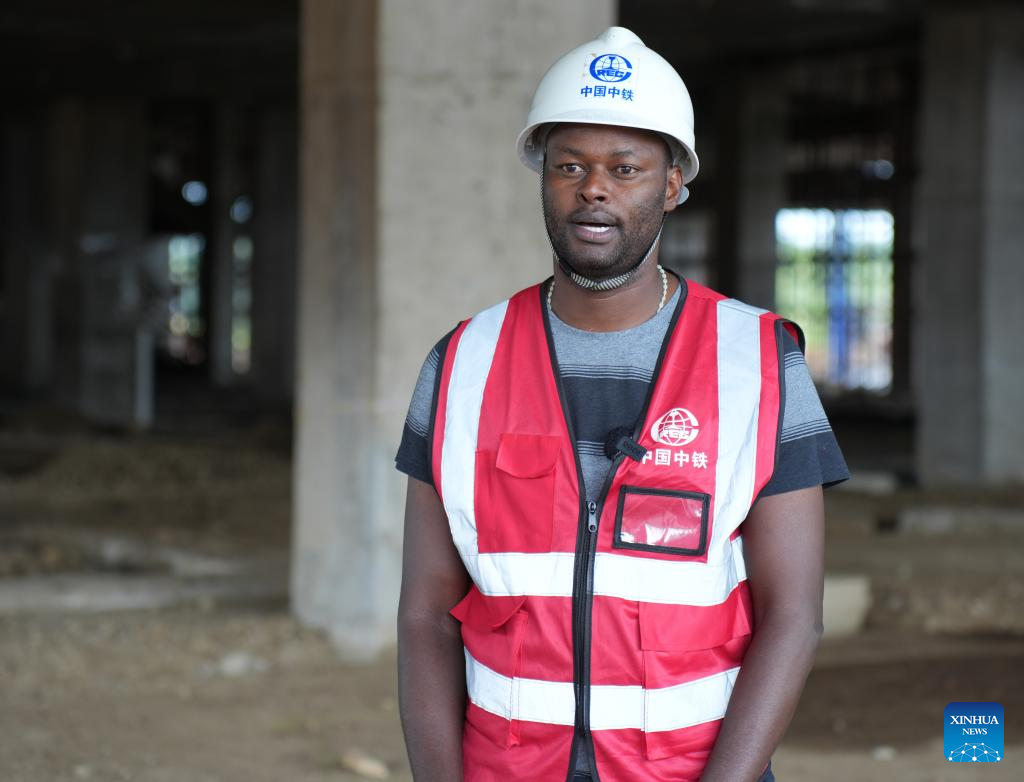
Patrick Mallya, a seasoned quantity surveyor with nine years of experience at China Railway Construction Engineering Group (CRCEG), speaks in an interview in Arusha, Tanzania, on April 25, 2025. Set to become one of the venues for the 2027 Africa Cup of Nations (AFCON), the stadium is more than just a sports facility; it is a symbol of Tanzania’s commitment to hosting major international events. (Xinhua/Li Yahui)
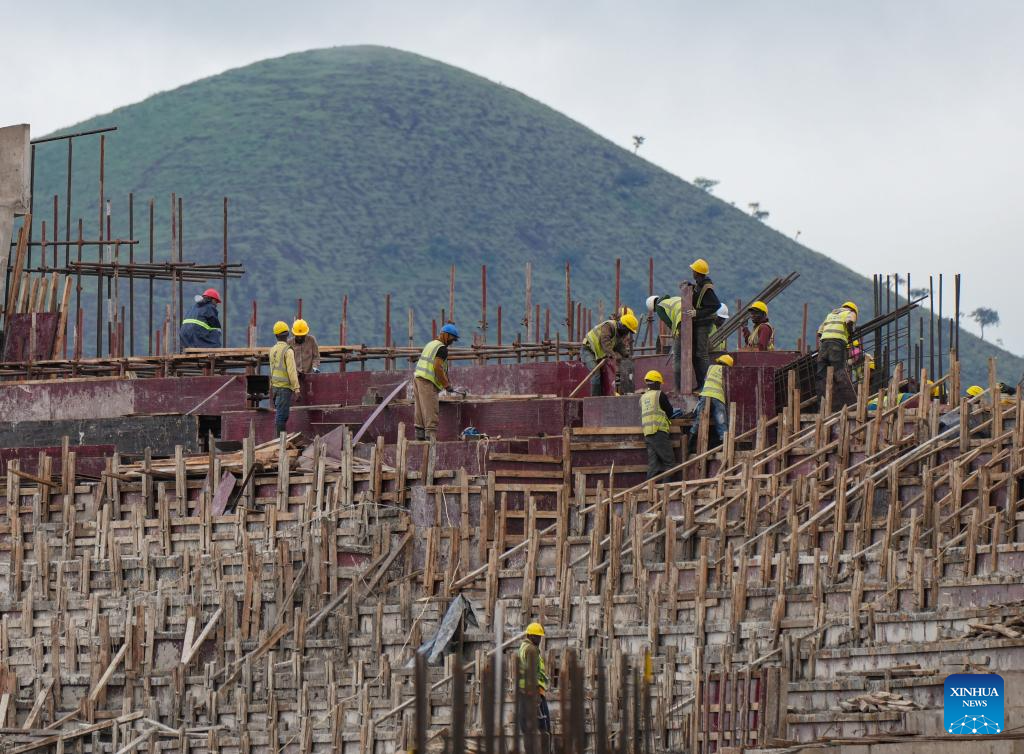
People work at a comprehensive sports stadium under construction by China Railway Construction Engineering Group (CRCEG) in Arusha, Tanzania, on April 25, 2025. Set to become one of the venues for the 2027 Africa Cup of Nations (AFCON), the stadium is more than just a sports facility; it is a symbol of Tanzania’s commitment to hosting major international events. (Xinhua/Li Yahui)
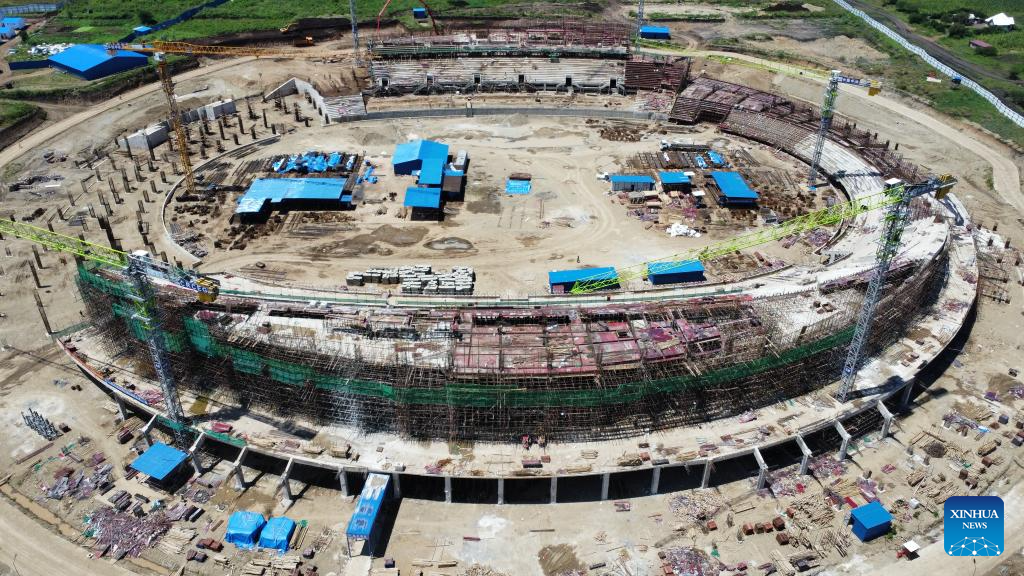
An aerial drone photo taken on April 28, 2025 shows a comprehensive sports stadium under construction by China Railway Construction Engineering Group (CRCEG) in Arusha, Tanzania. Set to become one of the venues for the 2027 Africa Cup of Nations (AFCON), the stadium is more than just a sports facility; it is a symbol of Tanzania’s commitment to hosting major international events. (CRCEG/Handout via Xinhua)
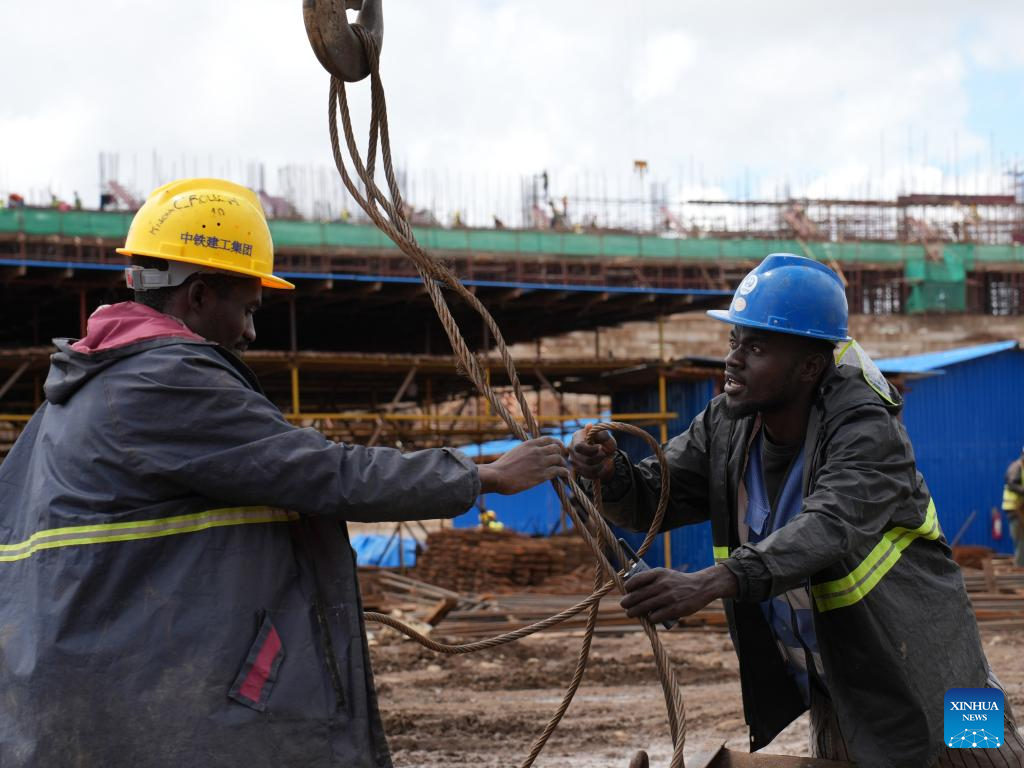
People work at a comprehensive sports stadium under construction by China Railway Construction Engineering Group (CRCEG) in Arusha, Tanzania, on April 25, 2025. Set to become one of the venues for the 2027 Africa Cup of Nations (AFCON), the stadium is more than just a sports facility; it is a symbol of Tanzania’s commitment to hosting major international events. (Xinhua/Li Yahui)
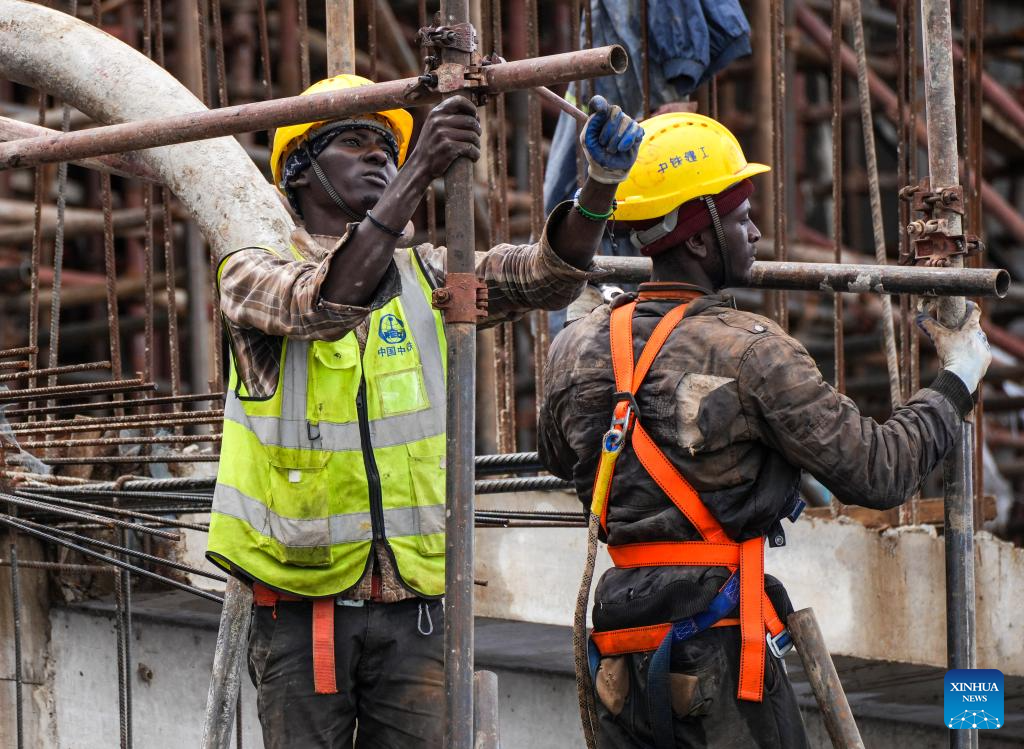
People work at a comprehensive sports stadium under construction by China Railway Construction Engineering Group (CRCEG) in Arusha, Tanzania, on April 25, 2025. Set to become one of the venues for the 2027 Africa Cup of Nations (AFCON), the stadium is more than just a sports facility; it is a symbol of Tanzania’s commitment to hosting major international events. (Xinhua/Li Yahui)
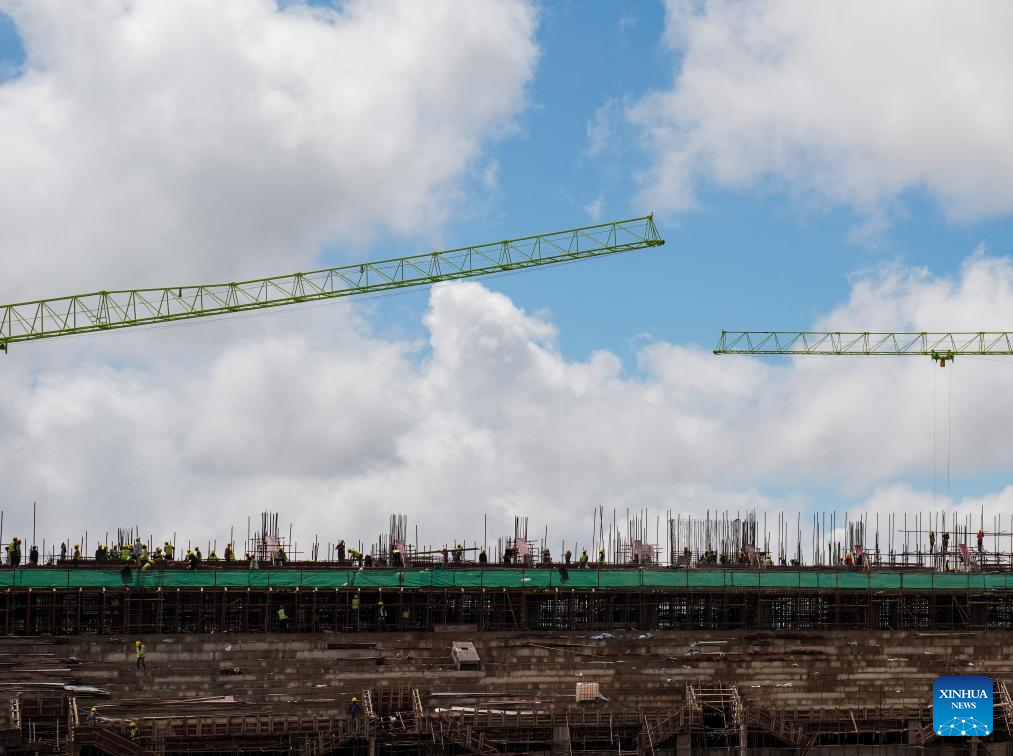
People work at a comprehensive sports stadium under construction by China Railway Construction Engineering Group (CRCEG) in Arusha, Tanzania, on April 25, 2025. Set to become one of the venues for the 2027 Africa Cup of Nations (AFCON), the stadium is more than just a sports facility; it is a symbol of Tanzania’s commitment to hosting major international events. (Xinhua/Li Yahui)
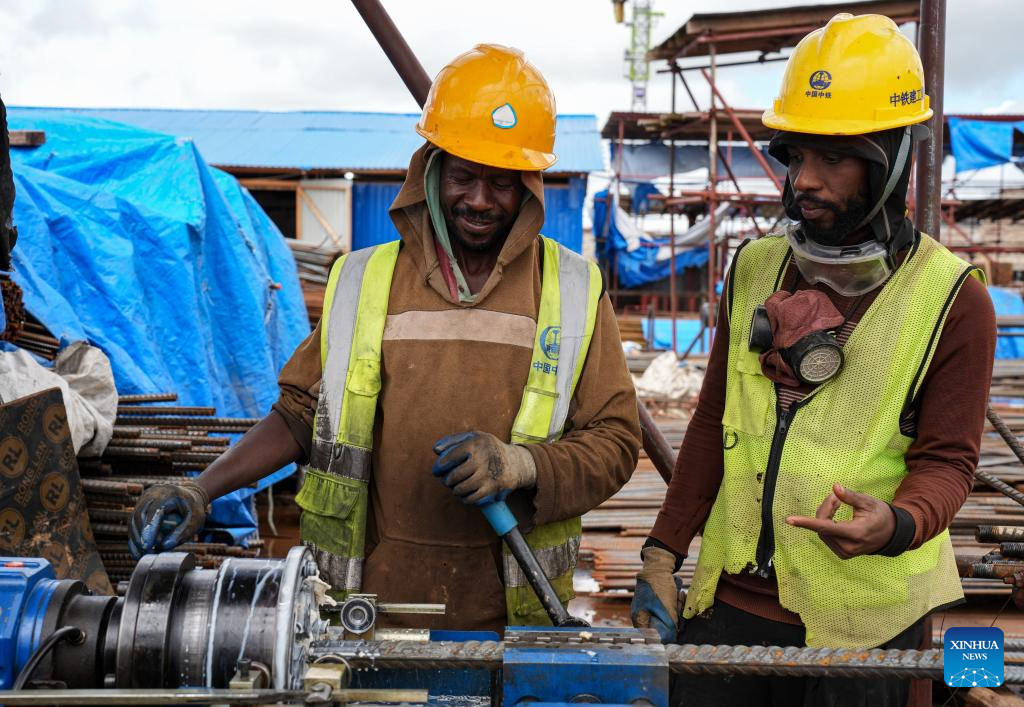
People work at a comprehensive sports stadium under construction by China Railway Construction Engineering Group (CRCEG) in Arusha, Tanzania, on April 25, 2025. Set to become one of the venues for the 2027 Africa Cup of Nations (AFCON), the stadium is more than just a sports facility; it is a symbol of Tanzania’s commitment to hosting major international events. (Xinhua/Li Yahui)
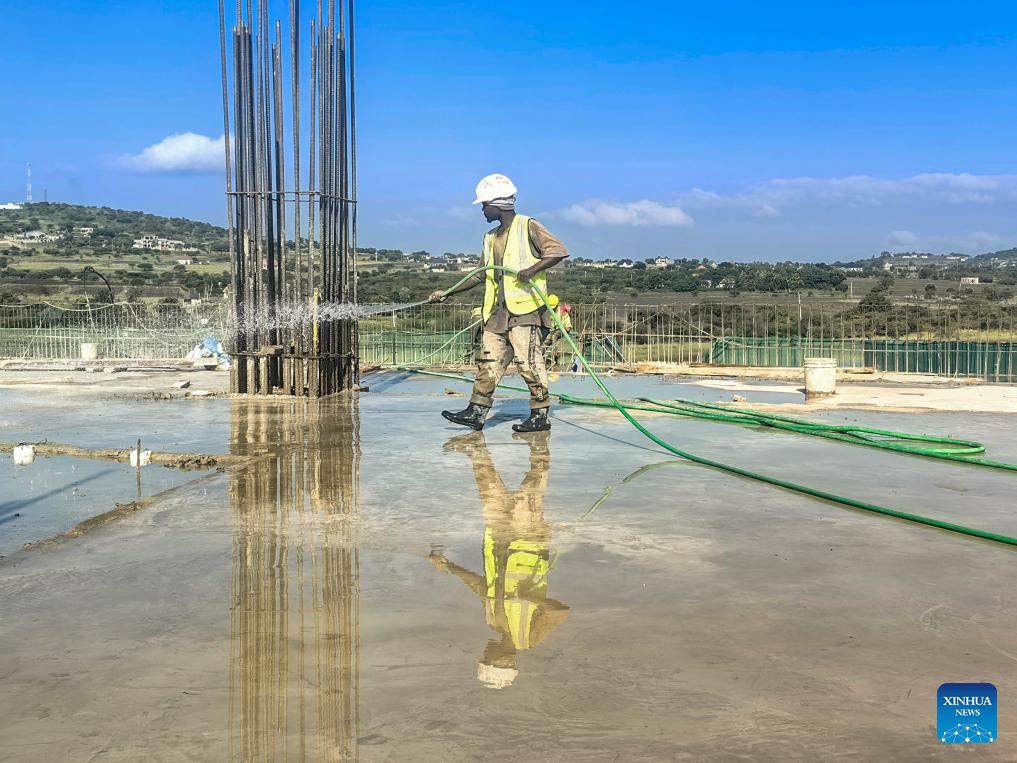
A man works at a comprehensive sports stadium under construction by China Railway Construction Engineering Group (CRCEG) in Arusha, Tanzania, on Feb. 10, 2025. Set to become one of the venues for the 2027 Africa Cup of Nations (AFCON), the stadium is more than just a sports facility; it is a symbol of Tanzania’s commitment to hosting major international events. (CRCEG/Handout via Xinhua)

